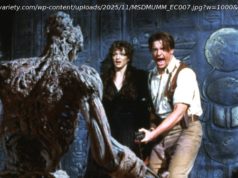‚Being in his head is not a place you want to be,‘ actor says of role.
Being a professional actor can be a dream job. You get to pretend for a living. If you’re lucky, not only will you get well-paid for it but people in today’s celebrity-obsessed culture might worship you for your trouble.
But then there are times when you get asked to portray someone like David Duke.
The latter is the case for Topher Grace („That ’70s Show“), who plays the former Ku Klux Klan Grand Wizard in writer-director Spike Lee’s buzz-generating satire “ BlacKkKlansman .“ The film, which opens Friday (Aug. 10) in wide release, chronicles the story of Ron Stallworth, a black police officer who infiltrated the Klan in the late 1970s. It’s a bizarre story, but it’s also true and, consequently, pretty irresistible stuff.
Considerably less irresistible for Grace, however, was the idea of slipping into the head of someone as notorious as Duke.
„I remember reading the script and thinking, ‚There’s only one guy I would feel safe playing this role for,'“ Grace said in a recent interview with The Hollywood Reporter . „I didn’t want to play David Duke in a TV movie of the week. I want to play David Duke in a Spike Lee joint. (Duke is) a horrible, evil man. But as an actor, it’s a juicy, wonderful role.“
To prepare for it, he listened to Duke’s radio show. He also read Duke’s memoirs — „it’s a doorstop,“ he said — although he stopped short of contacting the real David Duke. „No, I did not reach out to him,“ Grace told Savannah Guthrie of NBC’s „Today“ on Tuesday morning (Aug. 7). „People are asking now if I want to talk to him, and I’m like, ‚Oh, my god, no.'“
To capture Duke’s mannerisms and speaking cadence, Grace also watched old interviews, including a couple of appearance on „The Phil Donahue Show“ from the 1980s. „That was the best thing, to see him with a crowd that hated him,“ Grace told Guthrie. „It’s what’s so evil about him. He’s even good with that crowd.“
Which is precisely how Duke managed to put a new, more palatable face on racism in the 1970s and ’80s, Grace said. He didn’t wear his Klan robes in public. He didn’t casually throw around racial epithets. He is educated, he is media savvy, he projects an air of professionalism. He is, in his own way, charming.
And, that, Grace said, is part of what makes Duke so dangerous, even today.
„In the ’70s, there had been a perception of racists, maybe they had beer bellies, they were good old Southern boys,“ Grace says in the film’s studio-provided production notes. „David, he’s very media friendly and very intelligent. He always wears a three-piece suit. He changed that perception of racism at the time to what it is today.“
While Grace says he doesn’t generally immerse himself in his roles the way some actors do, it was hard not to be negatively affected by becoming David Duke.
One scene in particular was difficult for Grace to shoot. In it, he — as Duke — and his fellow Klansmen reverentially watch the notoriously 1915 silent film „Birth of a Nation,“ which is widely recognized as perpetuating racial stereotypes and furthering the Lost Cause theory that even today fuels white nationalist ideology.
„There were a couple days on set, I had to take a moment and just detox — it felt so horrible and oppressive and wrong,“ Grace said. „What’s so great about Spike Lee, he would come over and just say, ‚Hey, man, don’t worry. This is a terrible day. I’m not enjoying myself, but it’s in service of something I’m trying to say.‘ He really made me feel as comfortable as you can, saying those words and doing those things.“
For his part, Stallworth — the black police officer whose story is told in „BlacKkKlansman“ — gave Grace high marks for his transformation, which saw the actor sporting the trademark mustache Duke wore in the late 1970s and early 1980s.
„It’s an eerie feeling listening to Topher on the big screen because he has the uncanny knack of being able to sound like David Duke,“ Stallworth says in the film’s production notes. „He sounded like the David Duke that I dealt with in 1978. Even the makeup made him look very similar to the David Duke of that time period.“
In his Tuesday interview on „Today,“ Grace sounded like a man who was simply glad to have the experience behind him.
„I’m not a method actor,“ Grace said. „I don’t get so into my work all the time or take it home with me. But this one, it’s just overwhelmingly depressive, the ideas that — being in his head is not a place you want to be.“
Gallery: Spike Lee’s ‚BlacKkKlansman‘






